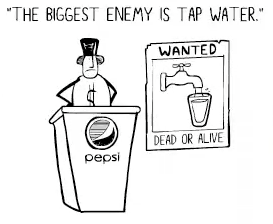Although we emailed WaterAid with some questions, we were very surprised indeed that they responded, as they are such an amazing and inspirational charity! WaterAid is an international non-profit organisation that was first set up as a response to the UN International Drinking Water & Sanitation decade (1981–1990). It works in 27 countries worldwide, changing millions of lives every year by providing people with clean water, safe toilets and hygiene education.
Here is the reply that WaterAid sent us - they didn't respond directly to our questions, but definitely replied with some interesting answers...
Thank you for your email. Our focus is on international development, and the provision of low tech water solutions which produce clean water from the source, however I hope the information below is useful for your project.
WaterAid champions tap water in the UK as a safe, affordable and sustainable source of drinking water. However we also recognise that drinking bottled water is a lifestyle choice that many UK consumers make. Those who choose to buy bottled water can now also choose to support WaterAid's lifesaving work by buying Belu, and we welcome the chance it provides us to increase our investment to help those for whom the choice does not exist.

